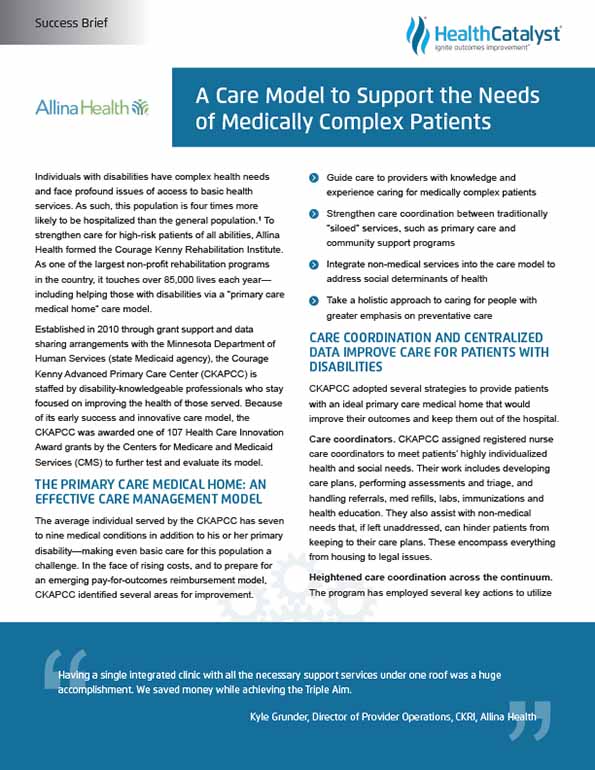Individuals with disabilities encounter significant challenges in accessing basic healthcare, which can lead to increased use of hospitals and emergency rooms. Allina Health implemented a "primary care medical home" model that assigns care coordinators and enhances service coordination. Allina's data-driven approach has positively impacted patient outcomes.
Individuals with disabilities have complex health needs and face profound issues of access to basic health services. As such, this population is four times more likely to be hospitalized than the general population.1 To strengthen care for high-risk patients of all abilities, Allina Health formed the Courage Kenny Rehabilitation Institute. As one of the largest non-profit rehabilitation programs in the country, it touches over 85,000 lives each year—including helping those with disabilities via a “primary care medical home” care model.
Established in 2010 through grant support and data sharing arrangements with the Minnesota Department of Human Services (state Medicaid agency), the Courage Kenny Advanced Primary Care Center (CKAPCC) is staffed by disability-knowledgeable professionals who stay focused on improving the health of those served. Because of its early success and innovative care model, the CKAPCC was awarded one of 107 Health Care Innovation Award grants by the Centers for Medicare and Medicaid Services (CMS) to further test and evaluate its model.
The average individual served by the CKAPCC has seven to nine medical conditions in addition to his or her primary disability—making even basic care for this population a challenge. In the face of rising costs, and to prepare for an emerging pay-for-outcomes reimbursement model, CKAPCC identified several areas for improvement.
CKAPCC adopted several strategies to provide patients with an ideal primary care medical home that would improve their outcomes and keep them out of the hospital.
Care coordinators. CKAPCC assigned registered nurse care coordinators to meet patients’ highly individualized health and social needs. Their work includes developing care plans, performing assessments and triage, and handling referrals, med refills, labs, immunizations and health education. They also assist with non-medical needs that, if left unaddressed, can hinder patients from keeping to their care plans. These encompass everything from housing to legal issues.
Heightened care coordination across the continuum. The program has employed several key actions to utilize multi-disciplinary collaboration and partner care team members with patients and their families.
A single source of truth. Allina implemented an EDW and analytics platform from Health Catalyst system-wide that combines claims data, medical records, state health care expense data, and other sources of data throughout the Allina system. This in turn enabled CKAPCC to take a number of actions:
Allina’s data-driven efforts to strengthen care of patients with disabilities has made a clear and meaningful impact on outcomes.
“Having a single integrated clinic with all the necessary support services under one roof was a huge accomplishment. We saved money while achieving the Triple Aim.”
– Kyle Grunder, Director of Provider Operations, CKRI, Allina Health
Allina’s model for advanced primary care has proven to effectively manage a complex population. It also offers a template for shifting a portion of the healthcare system away from fee for service. If Allina Health is successful in gaining partners on the payment side of healthcare delivery to fund this program in a value based payment methodology, expanding the clinic to other geographies within Minneapolis and St. Paul will be explored.


